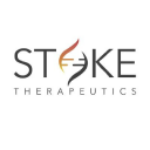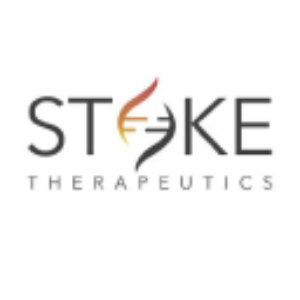Welcome to our dedicated page for Stoke Therapeutics news (Ticker: STOK), a resource for investors and traders seeking the latest updates and insights on Stoke Therapeutics stock.
Stoke Therapeutics, Inc. (STOK) is a clinical-stage biotechnology leader pioneering RNA-based medicines to address the root causes of severe genetic diseases. This page serves as the definitive source for official updates on therapeutic advancements, financial developments, and strategic initiatives related to their TANGO platform technology.
Investors and researchers will find curated press releases covering clinical trial progress, regulatory milestones, and peer-reviewed research on antisense oligonucleotide therapies. The repository includes updates on STOK's pipeline targeting central nervous system disorders and ocular conditions caused by haploinsufficiency.
Key content categories include treatment development timelines, partnership announcements with academic institutions, and financial performance reports. All materials maintain rigorous scientific accuracy while remaining accessible to both professional analysts and engaged public stakeholders.
Bookmark this page for direct access to Stoke Therapeutics' latest breakthroughs in RNA splicing modulation and protein restoration therapies. Regularly updated to reflect new developments in precision medicine innovation.
Stoke Therapeutics, Inc. (Nasdaq: STOK), a biotechnology firm focused on upregulating protein expression with RNA-based therapies, will present at the virtual SVB Securities Global Biopharma Conference on February 14, 2023, at 4:20 p.m. ET. This presentation will be in a fireside chat format and will be webcast live, available on Stoke's website for 30 days post-event. Stoke's lead compound, STK-001, targets Dravet syndrome, a severe genetic epilepsy, while STK-002 is under development for autosomal dominant optic atrophy. The company is headquartered in Bedford, Massachusetts, with operations in Cambridge, Massachusetts.
Stoke Therapeutics (NASDAQ: STOK) announced key milestones for 2023, focusing on its STK-001 therapy for Dravet syndrome. The company expects to complete Phase 1/2a studies this year to initiate a Phase 3 program in 2024. Additional safety data from the ongoing 45mg and 70mg dose cohorts is anticipated in mid and late 2023, respectively. As of September 30, 2022, Stoke had $252.2 million in cash, sufficient to fund operations until 2025. The firm is also advancing STK-002 for autosomal dominant optic atrophy (ADOA) towards clinical trials.
Nuvig Therapeutics, a biopharma company focused on autoimmune diseases, appointed Julie Anne Smith as CEO and Board member. With over 20 years in the life sciences sector, she has previously led biotech firms through drug development. Pamela Conley transitions to Chief Scientific Officer, having co-founded the company. Smith's leadership comes as Nuvig's lead program progresses towards IND-enabling activities. Nuvig aims to develop novel therapies to restore immune function without broad immunosuppression.
Stoke Therapeutics, Inc. (Nasdaq: STOK) will present at the 41st Annual J.P. Morgan Healthcare Conference on January 10, 2023, at 2:15 p.m. ET. The presentation will discuss the company’s innovative RNA-based medicines aimed at addressing severe diseases through upregulating protein expression. A live audio webcast will be accessible via the Investors & News section on Stoke’s website, with a replay available for 30 days post-event. Stoke is recognized for its proprietary TANGO approach and ongoing clinical trials for STK-001 in Dravet syndrome, as well as STK-002 for optic nerve disorders.
Stoke Therapeutics has reported promising interim results from clinical studies of STK-001, showing a 55% median reduction in convulsive seizure frequency among patients treated with three doses of 45mg. All but one of the patients showed a positive response. The treatment was well-tolerated with mild to moderate adverse events reported due to the study drug. Data from the ongoing SWALLOWTAIL study indicates sustained reductions in seizure frequency and improved non-seizure related measures, marking potential progress in the treatment of Dravet syndrome.
Stoke Therapeutics (Nasdaq: STOK) announced that seven abstracts on Dravet syndrome will be presented at the American Epilepsy Society (AES) 2022 Annual Meeting in Nashville, Tennessee, from December 2-6. The abstracts include findings from the Phase 1/2a studies, MONARCH and ADMIRAL, highlighting significant reductions in seizure frequency with the investigational drug STK-001. The company aims to develop STK-001 as the first disease-modifying therapy for Dravet syndrome, targeting the underlying genetic cause of this severe epilepsy.
Stoke Therapeutics (Nasdaq: STOK) reported encouraging interim results from ongoing Phase 1/2a studies of STK-001, a treatment for Dravet syndrome, showing a 55% median reduction in convulsive seizure frequency with three doses of 45mg. The drug was well-tolerated, with 74% of patients experiencing reduced seizure frequency. As of September 30, 2022, the company had $252.2 million in cash, funding operations into 2025. The company plans to report more data in 2023 and has received FDA Rare Pediatric Disease Designation for STK-001.
Stoke Therapeutics, Inc. (NASDAQ: STOK) announced a webinar and conference call for analysts and investors on November 14, 2022, at 8:30 a.m. ET. This event will present interim analysis data from Phase 1/2a studies involving STK-001, a treatment aimed at children and adolescents with Dravet syndrome. Participants can join by dialing the provided numbers or accessing the live broadcast on Stoke's website. An archived replay will be available for 90 days post-event.
Stoke Therapeutics announced the enrollment of the first patient in its FALCON study, focusing on autosomal dominant optic atrophy (ADOA), a rare genetic disorder causing severe vision loss. The study aims to evaluate disease progression and support the development of STK-002, a potential therapy targeting the underlying cause of ADOA. ADOA affects approximately one in 30,000 people globally, with no approved treatments currently available. The FALCON study will enroll about 45 patients across 10 sites in the U.S., U.K., Italy, and Denmark.
Stoke Therapeutics (Nasdaq: STOK) reported its Q2 2022 financial results, showing revenue of $3.2 million from a License and Collaboration Agreement, compared to none in 2021. The net loss for the quarter was $24.7 million, with R&D expenses rising to $18.4 million. The company has approximately $276.2 million in cash, expected to fund operations into 2025. In Q4, interim data from clinical studies on STK-001 in Dravet syndrome will be announced, focusing on safety and seizure frequency. Additionally, STK-002 received FDA orphan drug designation for Autosomal Dominant Optic Atrophy.


